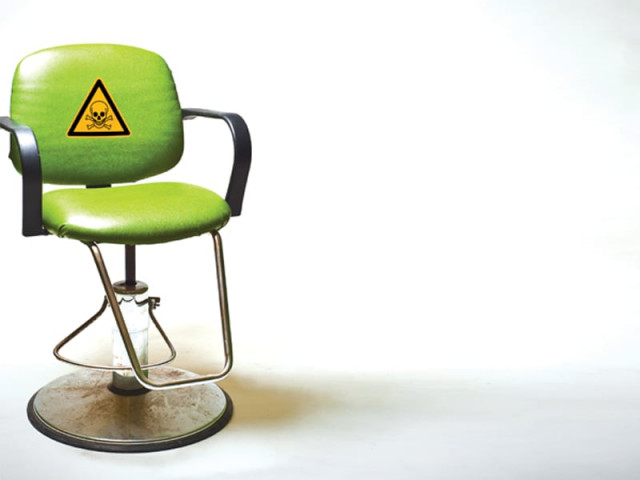Beauty salons: Can they be trusted?
Some beauty ‘experts’ lack the necessary qualification, technique and skill to carry out many services.

For US actor Gwyneth Paltrow, “Beauty is about being comfortable in your own skin”, but what happens when your own skin has been blemished? Obsessed with gora rung and ghane, lambe baal, girls often head to salons for beauty treatments. But are all parlours providing effective care? Have you ever gone to a parlour for a ‘new look’ but came back with damaged skin and fried, frizzy hair? See how advice from some beauticians can become a cause for concern.
To follow or not to follow?
Ambreen Khan remembers the day when, bored of her look, she went to one of the top salons in Karachi: “I went with a haircut in mind, but the beautician advised a change of hair colour. I spent an entire day in the salon and ended up with orange/reddish roots. My hair became extremely rough and frizzy. To fix the mess, I got them re-coloured and ended up damaging the texture of my hair.”
Dermatologist Dr Dhanani adds to this: “Sudden colour change is extremely harmful and slight touch-ups are better for one’s hair.”
Karachi-based dermatologist Dr Khilji says: “Salons mix products and this definitely damages the hair. It is best to use a good brand. If you use L’Oreal or Garnier Fructis, you won’t go wrong.”
Do they have the qualification?
Homemaker Asifa Siddique shares her unpleasant experience: “I went to a popular salon, where the beautician convinced me to have a whitening facial. For hours, they rubbed my face with various creams and scrubs and a few days later, I developed a skin allergy.”
Says Dr Dhanani: “To touch the human body, you need to be qualified. So when an unqualified person does these skin treatments, it is bound to be a disaster. A line must be drawn; there should be a domain for beauticians.”
Dr Khiljee states: “The owners of salons are definitely trained, but sometimes their employees are unskilled. These girls have no idea about what the customer’s skin type is. They have procedures like acne facials, but they have no idea how to treat acne. There are no checks or balances; nobody asks them for any qualification.”
Are they helpful?
Sadaf Rasool a housewife recalls that “after my hair cut, one of the beauticians at a parlour insisted I buy the parlour’s hair shampoo and conditioner. Once I used these products, my hair started falling”.
Eighteen-year-old student Madiha Shahid says, “I went for a haircut but the beautician told me that my skin was sagging and that I should try their hydration facial made from their own products. The mask burned my skin. When I complained, I was told this was normal. Afterwards, my face was left with reddish blotches and swelling in some areas. The beautician told that the redness would go in a couple of hours. The next morning, my skin had not improved and I could see some signs of acne.”
Dermatologist Rafiq Tareen says: “All the brands that are approved by The United States Food and Drug Administration or accepted by the European medical community are recommended, but the products created without the approval of the quality control board create havoc. Many salons have started mixing medicines such as Betnovate and cortisone which are not supposed to be used. The bleaches or masks these salons use are mixed with cortisones and that is where many problems start.”
What to do?
Karachi-based engineer Afshan Nadeem also has some bad experiences: “I went to get a facial and it was an absolute nightmare. The creams they used burned my skin and the blackhead remover was so sharp it gave me scars and I even had a blood clot. I immediately went to a dermatologist and began applying medicines to my damaged skin.”
Dr Tareen advises: “Treatments at salons should only be done under supervision and in hygienic conditions. It is important that the beautician sanitises her hands properly or wears gloves before touching the customer’s skin. If proper care is taken, the spread of infections can be prevented and the procedure can be carried out.
Published in The Express Tribune, August 18th, 2011.


















COMMENTS
Comments are moderated and generally will be posted if they are on-topic and not abusive.
For more information, please see our Comments FAQ